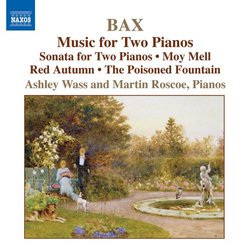| All Artists: Arnold Bax, Martin Roscoe, Ashley Wass Title: Bax: Music for Two Pianos Members Wishing: 0 Total Copies: 0 Label: Naxos Original Release Date: 1/1/2007 Re-Release Date: 9/25/2007 Genres: Dance & Electronic, Classical Styles: Chamber Music, Forms & Genres, Theatrical, Incidental & Program Music, Historical Periods, Classical (c.1770-1830), Instruments, Keyboard Number of Discs: 1 SwapaCD Credits: 1 UPC: 747313041374 |
Search - Arnold Bax, Martin Roscoe, Ashley Wass :: Bax: Music for Two Pianos
 | Arnold Bax, Martin Roscoe, Ashley Wass Bax: Music for Two Pianos Genres: Dance & Electronic, Classical |
Larger Image |
CD Details |
CD ReviewsExtraordinarily Enjoyable Two-Piano Music J Scott Morrison | Middlebury VT, USA | 10/24/2007 (5 out of 5 stars) "On my side of the Atlantic the piano music of Arnold Bax (1883-1953) is almost never heard -- a pity as all that I've ever heard (always by recordings) is immediately enjoyable. His music tends to combine features of late Romanticism with impressionistic harmonies and highly independent and complex chromatic counterpoint. He was known in his student days as both a breathtakingly talented improviser at the keyboard and as a consummate orchestral score reader. Yet he almost never appeared in public as a performer, either as pianist or conductor even of his own works. A man of independent means, he did not have to make a living and yet he was an indefatigable worker and wrote enormous amounts of music. For me it is his piano music that is most fascinating and enjoyable, although I also am very fond of some of his orchestral tone poems -- 'The Garden of Fand' and 'November Woods' in particular, and of course his most popular work, 'Tintagel'.
In Britain, however, Bax's music is frequently played and there have been some wonderful recordings of much of his work. This disc is labeled 'Volume 4' of Bax's piano works, although I've only ever seen Volume 2 Bax: Piano Works Vol. 2 - Piano Sonatas Nos. 3 & 4; Water Music; Winter Waters, which also featured the rising pianist, Ashley Wass, and contains the second and third sonatas as well as what in my mind is a minor masterpiece, 'Winter Waters.' This disc contains two-piano music and Wass is joined by the redoubtable Martin Roscoe, well-known as a teacher and as a pianist performing widely in both solo and two piano music. They start out with what has to be one of the most delightful pieces I've discovered in recent years, the 'Festival Overture'. And that it saw the light of day in modern times is a bit of a miracle, as booklet writer (and Bax biographer) Lewis Foreman recounts. One day he met another Bax enthusiast, pianist Vivian Langrish, who told him of this then-unknown piece, said he happened to have a manuscript copy in his music case, and lent it to Foreman saying 'it's quite safe, I have the [only] other copy'. Langrish died not long after and the other copy was never found. Foreman arranged for a BBC broadcast, the first performance in possibly fifty years. It is generally light-hearted, although there is a somewhat more serious section in the middle, and it evokes what Bax termed a 'carnival' spirit. As in all the music here, Wass and Roscoe give a definitive performance. Noteworthy is 'The Poisoned Fountain', another of Bax's 'water pieces', at the beginning of which the two pianists play their respective rapid figurations independently of each other, making for a particularly striking evocation of flowing water. The Irish-influenced 'Moy Mell' is perhaps better known as an orchestral piece, but this two-piano version is the original. This is one of Bax's 'Celtic twilight' pieces and is perhaps the most directly impressionistic work here. The 'Sonata for Two Pianos', in three movements and lasting about 22 minutes, is the biggest work here. It, like much of Bax's two-piano music, was written for the married team of Ethel Bartlett and Rae Robertson. Although there is no official program, Robertson said that Bax told him the first movement is about 'the coming of spring' and 'the sea in its many varieties of mood.' The second movement has striking similarities harmonically and melodically to Bax's orchestral tone poem, 'The Garden of Fand.' The third movement is an abandoned, even primitive dance that evokes both celebration and a sense of menace. 'The Devil That Tempted St. Anthony', also written for the Robertsons, is marked 'lento languido' and, like 'Moy Mell' is strongly influenced by French impressionism. 'Red Autumn' and 'Hardanger' are landscape pieces, the former limning autumn in the Chilterns, the latter painting, in a musical homage to the piano music Grieg, a scene in the Hardanger district of Norway. One cannot imagine better performances of these wonderful pieces. And the music itself is treasurable. Sound is excellent. Scott Morrison " |
